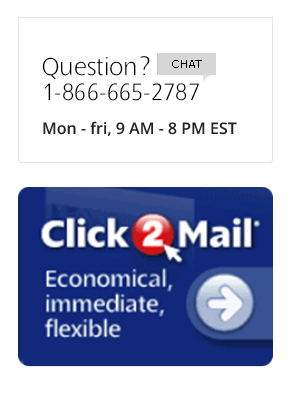Today, digital communication reigns supreme – and as a result, the unique charm and effectiveness of direct mail often goes unnoticed. However, integrating Customer Relationship Management (CRM) systems with direct mail strategies can unlock new opportunities for efficiency and personalization for businesses looking for new ideas to reach their customers.
Direct mail CRM integration is not just an enhancement; it’s a revolutionary approach to connecting with customers in a meaningful way. In this article, we delve into how CRM integration can elevate the effectiveness of direct mail, transforming it into a powerful tool in the arsenal of modern businesses.
The Benefits of a CRM in Direct Mail
CRM systems are more than mere repositories of client information. They are dynamic tools that, when leveraged effectively, can significantly amplify the impact of direct mail campaigns.
CRM integration serves as a crucial cog in the machinery of contemporary business strategies, particularly in the realm of direct mail. This integration enables businesses to:
- Automate and streamline the process of sending mail.
- Personalize content based on customer data.
- Track and measure the effectiveness of mail campaigns.
Lee Garvey, founder and CEO of direct mail service, Click2Mail, notes that you can optimize direct mail with a CRM using timing and event triggering in a CRM.
“You can know when something happens, and you can do something as a result,” he said. “Having a CRM allows you to automate that process.”
This automation is essential in managing sales events over a broad population of prospects, highlighting the CRM’s function in modern marketing.
Read more: Salesforce Direct Mail Integration: A How-To Guide
Timing and Personalization: The Heart of Direct Mail Success
The essence of a successful direct mail campaign lies in its timing and personalization. These two factors, when executed with precision, can significantly enhance the impact of direct mail.
Timing is Everything
When it comes to direct mail, you cannot underestimate the importance of timing, said Carly Brown, Customer Support Manager at Click2Mail.
“It’s almost always about getting the right piece to the right person at the right time,” she said.
Imagine a real estate company sending out promotional postcards offering a free home valuation service. Unfortunately, the mail arrives two weeks after a major local real estate fair, where most of the targeted recipients have already engaged with competing services.
If the timing is off, the message loses its relevance and impact. By having your direct mail campaign fully integrated into a CRM, it’s a lot easier to get the timing right.
Personalization: Connecting on a Personal Level
The ability to personalize content based on customer data is a powerful advantage of CRM integration. It allows businesses to send messages that resonate personally with the recipients, thereby increasing engagement and response rates.
Once again, this is an area where a CRM can really help – through your CRM, you have plenty of personal details about your prospects that you can use to personalize direct mail for that particular individual.
Consider a pet store that utilizes its CRM to track customer purchases and pet information. Based on this data, the store sends out direct mail to a customer who recently bought a new puppy.
The mail includes a personalized greeting with the puppy’s name and offers a discount on puppy training classes and age-appropriate toys. In this example, both personalization and timing combine to create a powerful impact on your prospect.
Challenges in Managing Direct Mail Campaigns – And How CRMs Can Help
Despite its potential, managing direct mail campaigns can be fraught with challenges. However, CRM integration offers solutions to these obstacles.
Overcoming Data Management Hurdles
CRM systems play a crucial role in managing large volumes of customer data, ensuring its relevance and timeliness for direct mail campaigns. These systems constantly update and maintain customer details, tracking important milestones and purchases. This ongoing data refinement is essential for sending relevant and timely mail, aligning content with customer events or status.
Furthermore, CRM capabilities include sophisticated data segmentation, allowing businesses to categorize customers based on criteria like purchase history or engagement levels. This segmentation enables the creation of tailored direct mail content, significantly enhancing customer engagement and response rates.
By utilizing CRM for data-driven insights, businesses can develop targeted and effective direct mail strategies, moving beyond generalized approaches to personalized customer communication.
Simplifying Inventory and Operational Complexities
CRM integration significantly streamlines inventory management in mailroom operations, enhancing efficiency and reducing operational complexities in seven key ways:
- Automated Inventory Tracking: CRM systems automate tracking of mailing supplies, minimizing manual efforts and errors.
- Predictive Analytics for Inventory Planning: Utilizing historical data, CRM predicts future inventory needs, ensuring preparedness and avoiding stock shortages or excess.
- Streamlined Ordering Process: When inventory levels drop, CRM can automatically generate reorders, speeding up replenishment and reducing downtime.
- Customization and Print-on-Demand: CRM stores customization details for direct mail pieces, enabling print-on-demand services and reducing the need for large pre-printed material inventories.
- Cost Management and Reduction: Clear visibility of inventory usage through CRM aids in efficient budgeting and cost control, avoiding unnecessary purchases.
- Enhanced Coordination with Vendors: Improved communication with print vendors and postal services through CRM ensures timely material delivery and replenishment.
- Compliance and Reporting: CRM tracks inventory in compliance with regulations and facilitates easy auditing and historical analysis.
Adapting to Postal Service Changes
Postal service rules are changing all the time, which adds another layer of complexity. For example, Garvey pointed out that the USPS will eliminate a lot of small postage meters in the summer of 2024, which will have a big impact on small businesses.
To stay abreast of these changes, companies should regularly consult USPS resources, like their official website or direct mail newsletters, which provide updates on regulations and requirements.
Integrating CRM systems can further streamline this adaptation process. CRM tools can be configured to receive and assimilate updates directly from postal service feeds or through integration with mailing software that stays current with USPS changes.
This ensures that businesses automatically adjust their mailing strategies in response to the latest postal regulations, maintaining compliance and efficiency without manual oversight.
Categorization: Enhancing Efficiency and Targeting in Direct Mail
Categorization within CRM systems is a game-changer for direct mail campaigns. As Garvey stated, “CRM allows you to put the records into buckets, and then act on a bucket as opposed to an individual.”
This means that businesses can group customers based on various criteria, such as demographics, purchase behavior, or interaction history. By categorizing these records, companies can streamline their direct mail efforts, sending targeted messages that are more likely to resonate with each group.
This strategic approach saves time and resources, as it eliminates the need for one-size-fits-all campaigns and allows for more efficient, targeted communication.
Future-Proofing Mailroom Operations
In the ever-evolving landscape of mailroom operations, staying ahead of the curve is crucial for businesses. CRM integration offers a vital pathway to modernization, ensuring operations aren’t hindered by outdated practices.
CRM integration brings several key benefits:
- Automation and Efficiency: Automating tasks like sorting and dispatching mail reduces errors and speeds up processes, making operations more efficient.
- Agility in Response to Market Changes: Quick adaptation of mailing strategies based on real-time CRM data ensures relevancy in a dynamic market.
- Scalability: As a business grows, CRM systems scale to handle increased mail volumes, supporting expansion without operational constraints.
- Compliance Management: CRM systems stay updated with regulatory changes, aiding businesses in navigating complex postal regulations and data protection laws.
- Innovation in Mailing Solutions: Leveraging CRM data for personalized and engaging mail experiences, such as incorporating QR codes or augmented reality, sets businesses apart and enhances customer engagement.
CRM integration not only automates and streamlines operations but also positions businesses for growth and adaptability, keeping them competitive and compliant in a rapidly changing environment.
How to Start Integrating Your Direct Mail Campaigns With Your CRM
Integrating direct mail campaigns with CRM systems has become a necessity for businesses aiming to enhance their marketing effectiveness. This integration brings precision, efficiency, and a personalized approach to your marketing efforts. But where do you even begin?
Click2Mail’s CRM Hub is at the forefront of this integration, offering a seamless way to combine CRM data with direct mail strategies.
Key features of Click2Mail’s CRM Hub include:
- Effortless CRM Integration: Connects easily with popular CRM platforms like Citrix Podio, Follow-Up Boss, and Salesforce.
- Automated Direct Mail Management: Automates the direct mail process, from data synchronization to mail dispatch.
- User-Friendly Setup: Simple steps for integration:
- Bridge connections between CRM and Click2Mail accounts.
- Customize your mail campaigns with specific instructions.
- Enjoy automated, streamlined mail workflows.
Advantages of using Click2Mail’s CRM Hub:
- Optimizes Marketing Efforts: Leverages CRM data for targeted and effective mail campaigns.
- Enhances Customer Satisfaction: Personalizes mail based on customer data, increasing engagement.
- Streamlines Operations: Automates and simplifies mailing tasks, saving time and resources.
- Cost-Effective: No monthly fees; pay only for the mail you send.
By using Click2Mail’s CRM Hub, businesses can significantly improve their direct mail campaigns. This tool not only modernizes the direct mail process but also ensures that businesses stay connected with their customers through timely and relevant mail, enhancing customer relationships and business growth.
Contact us today and let’s talk about what we can do for you.





